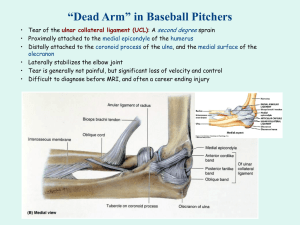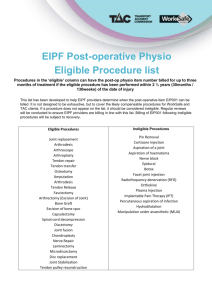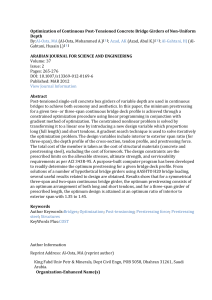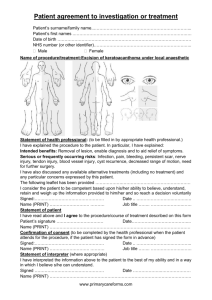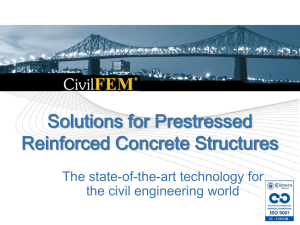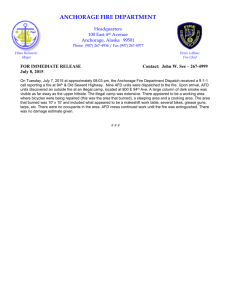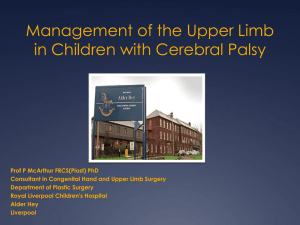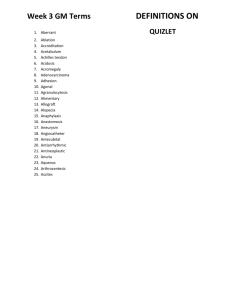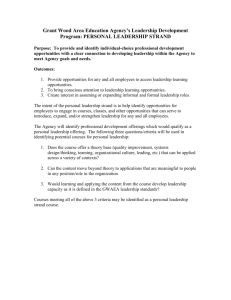TAB.3-13 Post-Tensioning Terminology (PTT)
advertisement
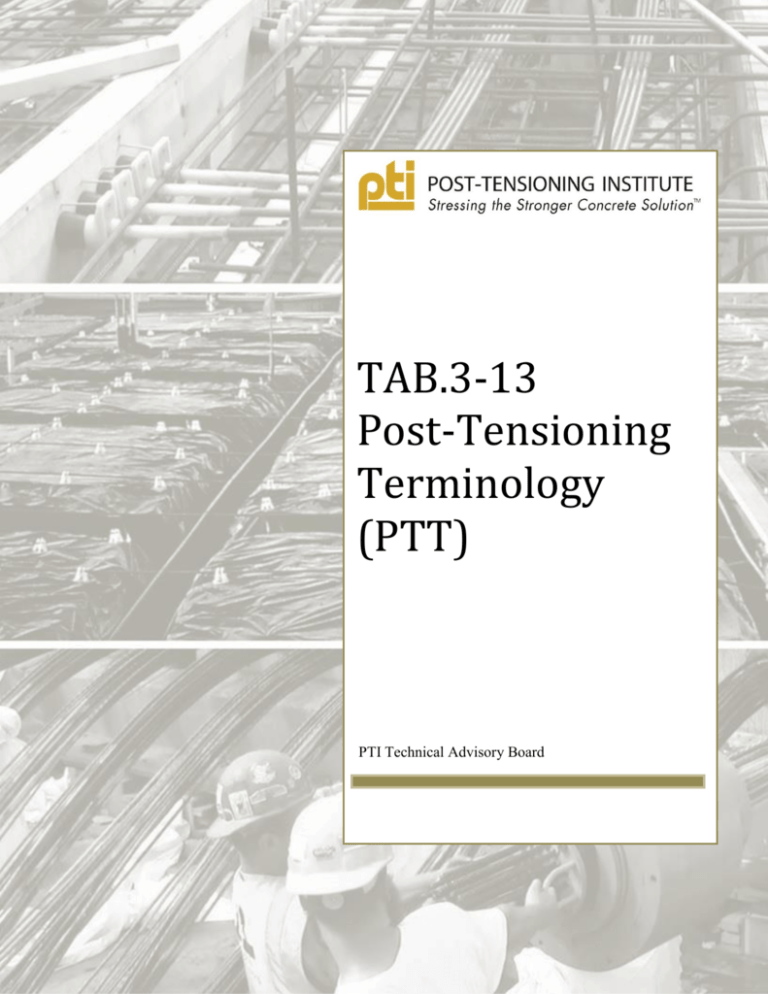
November 2013 TAB.3-13 Post-Tensioning Terminology (PTT) PTI Technical Advisory Board Page 0 of 36 Post-Tensioning Terminology (PTT) November 2013 The following Post-Tensioning Terminology (PTT) document contains the consensus definitions for terms relating to the post-tensioning field. To Committee Members: Please use these definitions when drafting or revising a document. If a definition is present in the PTT, please do not define it again, but refer to the PTT document in the definition section. If the committee feels that a definition beyond the PTT is required, please draft the definition and forward to PTI staff. If the committee feels that a term needs to be added or an existing definition needs modification, please email PTI staff with the request. All requests for modification will be considered by TAB. Table of Contents Components .................................................................................................................................... 1 Equipment ..................................................................................................................................... 22 Tendon Stressing ........................................................................................................................... 25 Design ........................................................................................................................................... 26 Troubleshooting / Repair .............................................................................................................. 30 Concrete / Grouting Materials ...................................................................................................... 32 Index ............................................................................................................................................. 33 Post-Tensioning Terminology (PTT) November 2013 Components Anchor For unbonded single strand tendons, a device that houses the wedges and transfers the prestressing force to the concrete. Anchor Wedge cavity (single strand anchor) Page 1 of 33 Post-Tensioning Terminology (PTT) Bearing plate, basic November 2013 Flat steel plate that transfers the tendon force directly into the concrete, meeting the analytical design requirements of PTI “Acceptance Standards for Post-Tensioning Systems, “Section 3.1. Basic bearing plate Bearing plate, special Any hardware that transfers tendon force into the concrete and does not meet the analytical design requirements of PTI “Acceptance Standards for Post-Tensioning Systems,” Section 3.1. Typically includes spiral confinement reinforcement. Special bearing plate Page 2 of 33 Post-Tensioning Terminology (PTT) Anchor, barrel November 2013 A special anchor used for single strand tendons, consisting of a cylindrical metal device housing the wedges. Normally used with a bearing plate to transfer the prestressing force to the concrete. Also used with miscellaneous steel members in barrier cable applications. Barrel Anchor with wedges Anchor nut Threaded device that screws onto a threaded stress bar and transfers the force from the bar to the bearing plate. Anchor nut Page 3 of 33 Post-Tensioning Terminology (PTT) Anchorage (assembly) November 2013 A mechanical device consisting of all components required to transfer the posttensioning force from the prestressing steel to the structure, including all accessories for encapsulation or grouting. Anchorage (assembly) for multistrand tendons Anchorage (assembly) for single strand tendons Page 4 of 33 Post-Tensioning Terminology (PTT) Anchorage, intermediate November 2013 The anchorage located at any point along the tendon used to stress only a portion of the tendon at a construction joint. The tendon may be continuous or spliced at that location. Intermediate Anchorage Page 5 of 33 Post-Tensioning Terminology (PTT) November 2013 Anchorage, fixed The anchorage that is not used for stressing of the tendon. For unbonded single strand tendons, this anchorage is normally attached to the tendon at the plant. Fixed Anchorage Fixed Anchorage Page 6 of 33 Post-Tensioning Terminology (PTT) Anchorage, stressing November 2013 The anchorage at one or both ends of a tendon that is used for stressing. Page 7 of 33 Post-Tensioning Terminology (PTT) Back-up bars November 2013 For unbonded single strand tendons, minimum nonprestressed reinforcement parallel to slab edge used to resist tensile forces in the concrete caused by the applied prestressing force. Back-up Bars Back-up Bars Page 8 of 33 Post-Tensioning Terminology (PTT) Bursting steel November 2013 For unbonded single strand tendons, nonprestressed reinforcement used to resist the tensile forces in the concrete caused by the applied prestressing force from multiple anchorages. Bursting Steel Page 9 of 33 Post-Tensioning Terminology (PTT) Confinement reinforcement November 2013 Nonprestressed reinforcement, typically a spiral, in the local anchorage zone. Confinement reinforcement Confinement reinforcement Page 10 of 33 Post-Tensioning Terminology (PTT) Duct November 2013 A conduit to accommodate prestressing steel installation and provide an annular space for grouting. Metal duct Plastic duct Plastic duct Inlet Tubing with connection to duct used for injection of the grout into the duct. Page 11 of 33 Post-Tensioning Terminology (PTT) November 2013 Local zone reinforcement For multistrand tendons, nonprestressed reinforcement used as confinement reinforcement of the local anchorage zone. Monostrand (Single Strand) Tendon with one strand. Page 12 of 33 Post-Tensioning Terminology (PTT) November 2013 Multistrand Tendon with more than one strand. Outlet Tubing with connection to duct used to allow the escape of air, grout, and bleed water from the duct. Pocket former A device that forms a temporary recess in the concrete to allow access for stressing. Pocket Former Page 13 of 33 Post-Tensioning Terminology (PTT) Sheathing November 2013 For unbonded single strand tendons, an enclosure in which prestressing steel is encased to prevent bond with surrounding concrete that provides corrosion protection and contains PT coating. Sheathing Slab bolster Continuous hardware used to support and hold post-tensioning tendons and reinforcing steel in place before and during concrete placement. Strand High strength steel wires wound around a center wire, typically seven-wire strand, conforming to ASTM A416/A416M. Page 14 of 33 Post-Tensioning Terminology (PTT) Strand tail November 2013 The protruding length of the strand outside of the wedges that remains in place after the tendon tail has been cut off. Strand Tail Stress bar High strength steel bar used in post-tensioning conforming to ASTM A722 / A722 M. Page 15 of 33 Post-Tensioning Terminology (PTT) Stressing pocket November 2013 The recess created by the pocket former between the stressing or intermediate anchorage and the edge of the concrete to allow the nosepiece access for stressing. Stressing Pocket Tendon A complete assembly of a prestressing element consisting of anchorages and couplers, prestressing steel, and sheathing or duct with PT coating for unbonded applications or grouted ducts, grout caps, and grout vents for bonded applications. Bonded tendon Tendon in which prestressing steel is bonded to the concrete and is permanently prevented from moving relatively to the concrete. Unbonded tendon Tendon in which the prestressing steel is prevented from bonding to the concrete, and is permanently free to move relatively to the concrete. The prestressing force is transferred to the concrete only by the anchorages or deviators. Page 16 of 33 Post-Tensioning Terminology (PTT) Encapsulated tendon November 2013 A tendon that is completely enclosed in a watertight covering from end to end, including anchorages, sheathing with PT coating and an encapsulation cap over the strand tail at each end. Encapsulated Anchor Encapsulation Cap Temperature tendon Tendon used to resist shrinkage and temperature stresses. Added tendon Tendon, usually short in length, added to continuous tendons and placed in specific locations, such as end bays, to increase the local prestressing force. Page 17 of 33 Post-Tensioning Terminology (PTT) Banded tendons November 2013 Closely spaced groups of tendons in a narrow strip in one direction in two-way floor systems, typically centered on column or support lines. Banded Tendons Distributed tendons Single tendon or groups of tendons, uniformly spaced in one direction, typically perpendicular to banded tendons or to beams. Distributed Tendons Page 18 of 33 Post-Tensioning Terminology (PTT) Tendon tail November 2013 The protruding length of the tendon outside of the stressing anchorage needed temporarily for stressing of the tendon. Tendon Tail Page 19 of 33 Post-Tensioning Terminology (PTT) Trumpet November 2013 Connection piece between bearing plate and duct, in which the strands transition from the wedge plate pattern into a tight bundle inside the duct. Trumpet Wedges Pieces of tapered high-strength heat-treated steel with serrations (teeth) that penetrate the prestressing steel during transfer of prestressing force. Some anchorage systems use two-part wedges and some use three-part wedges. Two-part wedges Three-part wedges Wedge cavity The tapered opening in the anchor or wedge plate designed to allow the strand passing through and to accommodate the seating of the wedges. Page 20 of 33 Post-Tensioning Terminology (PTT) Wedge plate November 2013 For multistrand tendons, a device that houses the wedges and transfers the prestressing force to a bearing plate. Wedge cavity (in wedge plate) Wedge plate Page 21 of 33 Post-Tensioning Terminology (PTT) November 2013 Equipment Stressing equipment Equipment used for stressing tendons, consisting of a hydraulic jack and gauge(s) calibrated as a unit, and a hydraulic pump. Stressing equipment for single strands Stressing Equipment for multistrand tendons Page 22 of 33 Post-Tensioning Terminology (PTT) November 2013 Stressing equipment for stress bars Grippers Special wedges used in the single strand jack to hold the strand during the stressing operation. Hand seating tool For unbonded single strand tendons, a handheld device used to pre-seat the wedges in the anchor before stressing. Jack, monostrand A mechanical device (normally hydraulic) used to apply force to a single strand. Nosepiece The front part of the monostrand jack that bears against the anchor in order to align Page 23 of 33 Post-Tensioning Terminology (PTT) November 2013 the jack with the tendon. Nosepiece Wedge pipe For multistrand tendons, a handheld pipe used to pre-seat the wedges in the wedge plate before stressing. Page 24 of 33 Post-Tensioning Terminology (PTT) November 2013 Tendon Stressing Anchor set The movement of the wedges into the anchor or wedge plate, or nut into the bearing plate during the transfer of the prestressing force to the anchorage assembly. Blowout A localized concrete failure resulting from tendon forces, which occurs in the vicinity of the anchorage(s) or at tendon deviation points during or after stressing. Jacking force The specified temporary force exerted by the stressing jack on the tendon during stressing. Lift off A field procedure used to determine the actual force in a tendon at the point where the procedure is executed. Partial stressing Stressing of tendons to a force less than the full jacking force before the concrete reaches the concrete strength required for full stressing. Normally used to mitigate cracking due to plastic shrinkage and restraint to shortening. Stage stressing Stressing of tendons at different times instead of stressing at one time. Page 25 of 33 Post-Tensioning Terminology (PTT) November 2013 Design Anchorage zone The portion of the member through which the concentrated prestressing force is transferred to the concrete and distributed across the section. It includes the local and general anchorage zones. For anchorage devices located away from the end of the member, the anchorage zone includes the disturbed regions behind and ahead of the anchorage. Local anchorage zone The prismatic region in which the concentrated prestressing force is introduced into the concrete, surrounding the bearing plate including confinement reinforcement and the minimum concrete cover. The length of the local anchorage zone extends over the confinement reinforcement. General anchorage zone The region in which the concentrated prestressing force spreads out over the cross section of the structural member (Saint Venant Region). It includes the local anchorage zone. The general anchorage zone extends from the anchorage along the axis of the member for a distance equal to the overall depth of the member. The height of the general anchorage zone is equal to the overall depth of the member. Balanced moments Moments caused by balanced loads. Balanced loads Loads applied to the member by the prestressing tendon. Page 26 of 33 Post-Tensioning Terminology (PTT) November 2013 Barrier cable A vehicular barrier and/or pedestrian guard consisting of a group of parallel highstrength steel strands. Eccentricity Distance between the center of gravity of the concrete cross-section and center of gravity of the prestressing steel (CGS) at any point along the length of a member. Elongation Increase in length of prestressing steel due to the stressing force. Friction loss The loss of force in prestressing steel resulting from friction between the prestressing steel and its enclosure, affected by the angular deviation of the tendon. Effective Prestress Stress in a member due to final effective force. Final effective force Initial losses Force in prestressing steel after all prestress losses. Initial stress Stress in the prestressing steel immediately after anchor set. Hydrogen embrittlement Brittle cracking in high-strength steels caused by the conjoint action of tensile stress and the presence of a solution containing hydrogen ions (atomic hydrogen). Licensed design professional (LDP); An engineer or architect who is licensed to practice as defined by the statutory requirements of the professional licensing laws of a state or jurisdiction and who is responsible for the structural design and the preparation of contract documents for the work. Post-tensioning Method of prestressing in which prestressing steel is tensioned after concrete has The loss of force in a prestressing tendon that occurs during stressing resulting from friction losses, elastic shortening of concrete, and seating loss. Page 27 of 33 Post-Tensioning Terminology (PTT) November 2013 (PT) hardened. PT Installation Drawings Drawings furnished by the PT supplier showing information about the specifics of the PT system and tendon placement including, but not limited to the number, size, length, marking, location, elongation and profiles. PT supplier Contracting entity responsible for furnishing and delivering to the job site all components of the PT system including PT installation drawings and stressing equipment. Post-tensioning system (PTS) A tendon of a particular size, including prestressing steel, anchorages, local anchorage zone reinforcement, duct, trumpets, couplers, grout caps, inlets, outlets, etc. all supplied by a single PT supplier. Prestressed concrete Structural concrete in which internal compressive stresses are induced by means of prestressed reinforcement to reduce tensile stresses in the concrete due to applied loads. Prestressing steel High-strength steel used to prestress concrete, consisting of seven-wire strands, bars, wires, or groups of such elements. Pretensioning Method of prestressing in which prestressing steel is tensioned before the concrete is placed. Primary moments Prestressing force multiplied by eccentricity at any point along the tendon profile. Seating loss The loss of force in prestressing steel resulting from anchor set. Secondary effects Moments, shears and axial loads generated in an indeterminate member as a result of restraint of the member's supports to free movement of the member due to prestressing. Secondary moments Moments caused by reactions to balanced loads only. Tendon support system The support bars, chairs, slab bolsters and other accessories required to maintain the tendon profile. Tendon profile The specified path of a tendon from end to end in a member. Page 28 of 33 Post-Tensioning Terminology (PTT) November 2013 Time dependent losses The loss of force in a prestressing tendon that occurs over time resulting from concrete shrinkage and creep, and relaxation in the prestressing steel. Wobble friction Friction due to unintended angular deviations in the tendon profile. Yield strength The stress at which a material exhibits a specific limiting deviation from the proportionality of stress to strain. Page 29 of 33 Post-Tensioning Terminology (PTT) November 2013 Troubleshooting / Repair Anchor, troubleshooting A special anchor used for structural modification or repair of existing unbonded single strand tendons, consisting of a removable segment which allows the special anchor to be installed onto an existing continuous strand. The removed segment is then returned and held in place by screw or bolt. Troubleshooting Anchor (shown with wedges) Coupler A device used to connect the ends of tendons making them structurally continuous. Single strand coupler Page 30 of 33 Post-Tensioning Terminology (PTT) November 2013 Stress bar coupler Multistrand coupler Detensioning A method for releasing the force in a stressed tendon. Page 31 of 33 Post-Tensioning Terminology (PTT) November 2013 Concrete / Grouting Materials Bleed The autogenous flow of mixing water within, or its emergence from, newly placed grout; caused by the settlement of the solid materials within the mass and filtering action of strands, wires and bars. Final Set A degree of stiffening of the grout mixture greater than the initial set, indicating the time in hours and minutes required for the grout to stiffen sufficiently to resist, to an established degree, the penetration of a weighted test needle. Fluidity A measure of time, expressed in seconds necessary for a stated quantity of grout to pass through the orifice of the flow cone. Grout A mixture of cementitious materials and water, with or without mineral additives, admixtures or fine aggregate, proportioned to produce a pumpable consistency without segregation of the constituents injected into the duct to fill the space around the prestressing steel. Initial set A degree of stiffening of the grout mixture less than the final set, indicating the time in hours and minutes required for the grout to stiffen sufficiently to resist, to an established degree, the penetration of a weighted test needle. Set time The lapsed time from the addition of mixing water to a cementitious mixture until the mixture reaches a specified degree of rigidity as measured by a specific procedure. Setting The process, due to the chemical reactions, occurring after the addition of mixing water, which results in a gradual development of rigidity of a cementitious mixture. Thixotropic The property of a material that enables it to stiffen in a short time while at rest, but to acquire a lower viscosity when mechanically agitated. The process is reversible. Page 32 of 33 Post-Tensioning Terminology (PTT) November 2013 Index Added tendon ............................................ 17 Anchor......................................................... 1 Anchor nut .................................................. 3 Anchor set ................................................. 25 Anchor, barrel ............................................. 3 Anchor, troubleshooting ........................... 30 Anchorage (assembly) ................................ 4 Anchorage zone ........................................ 26 Anchorage, fixed ......................................... 6 Anchorage, intermediate ............................. 5 Anchorage, stressing ................................... 7 Back-up bars ............................................... 8 Balanced loads .......................................... 26 Balanced moments .................................... 26 Banded tendons ......................................... 18 Barrier cable .............................................. 27 Bearing plate, basic ..................................... 2 Bearing plate, special .................................. 2 Bleed ......................................................... 32 Blowout ..................................................... 25 Bonded tendon .......................................... 16 Bursting steel .............................................. 9 Confinement reinforcement ...................... 10 Coupler...................................................... 30 Detensioning ............................................. 31 Distributed tendons ................................... 18 Duct ........................................................... 11 Eccentricity ............................................... 27 Effective Prestress ..................................... 27 Elongation ................................................. 27 Encapsulated tendon ................................. 17 Final effective force .................................. 27 Final Set .................................................... 32 Fluidity ...................................................... 32 Friction loss ............................................... 27 General anchorage zone ............................ 26 Grippers..................................................... 23 Grout ......................................................... 32 Hand seating tool ...................................... 23 Hydrogen embrittlement ........................... 27 Initial losses .............................................. 27 Initial set.................................................... 32 Initial stress ............................................... 27 Inlet ........................................................... 11 Jack, monostrand....................................... 23 Jacking force ............................................. 25 Licensed design professional .................... 27 Lift off ....................................................... 25 Local anchorage zone ............................... 26 Local zone reinforcement ......................... 12 Monostrand (Single Strand) ...................... 12 Multistrand ................................................ 13 Nosepiece .................................................. 24 Outlet......................................................... 13 Partial stressing ......................................... 25 Pocket former ............................................ 13 Post-tensioning (PT) ................................. 28 Post-tensioning system (PTS) ................... 28 Prestressed concrete .................................. 28 Prestressing steel ....................................... 28 Pretensioning............................................. 28 Primary moments ...................................... 28 PT Installation Drawings .......................... 28 PT supplier ................................................ 28 Seating loss ............................................... 28 Secondary effects ...................................... 28 Secondary moments .................................. 28 Set time ..................................................... 32 Setting ....................................................... 32 Sheathing................................................... 14 Slab bolster................................................ 14 Stage stressing ........................................... 25 Strand ........................................................ 14 Strand tail .................................................. 15 Stress bar ................................................... 15 Stressing equipment .................................. 22 Stressing pocket ........................................ 16 Temperature tendon .................................. 17 Tendon ...................................................... 16 Tendon profile ........................................... 29 Tendon support system ............................. 28 Tendon tail ................................................ 19 Thixotropic................................................ 32 Time dependent losses .............................. 29 Trumpet ..................................................... 20 Unbonded tendon ...................................... 16 Wedge cavity ............................................ 20 Wedge pipe ............................................... 24 Wedge plate .............................................. 21 Wedges ...................................................... 20 Page 33 of 33 Post-Tensioning Terminology (PTT) November 2013 Wobble friction ......................................... 29 Yield strength ............................................ 29 Page 34 of 33
